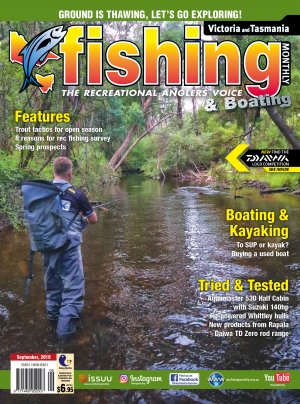“How can I keep my trailer and the boat secure?” It’s a question that all boaters have asked themselves at some point.
Just imagine this situation. You come back after a great day’s fishing only to find that some lowlife has decided he wants your trailer for himself. It happens more than most people realise, and at some of the most unlikely places.
I’ve even heard of our Boys in Blue once having a new rig for only two to three days before coming home after a water test to find that their brand new trailer was gone. You have to hand it to the people who stole the trailer – they had guts!
You’d be amazed at how easy it is to steal a trailer. An expert thief who’s determined will always find a way; what matters is how difficult you make it for them. Trailer security isn’t so much about providing failsafe protection. It’s about posing deterrents, the more the better.
There are plenty of different locks available on the market today, but not all of them are effective deterrents against thieves. Most boaters at least take the precaution of buying a coupling lock, but if it’s not used with a few other minor adjustments it’s basically useless.
Why? Well, your coupling is normally bolted to your trailer with bolts and nylock nuts. All the thieves have to do is carry a couple of 13/16 or 3/4 spanners. Two minutes later the trailer has a new coupling, is hooked to their car and is gone.
I remember having to help people who had come home from a day’s fishing only to find that all they had attached to their car was a tongue and a coupling-locked coupling.
Another popular security measure is to use Hayman Reese style tongues. However, because they are normally held in place with a pin, all the thief has to do is pull the pin and slot the whole tongue into their car, assuming it has a similar tongue configuration of course.
Rule 1 is this: if you want to use the coupling lock, take a hammer and burr the end of the nuts and bolts that hold the coupling on. That way, if a prospective thief tries to undo the nuts and bolts, it’ll be very difficult if not impossible. At worst, you’ll slow them down considerably.
Rule 2: if you have a Hayman Reese style square hitch, use a lock bolt rather than the single pin. It will mean the thief will have to come better prepared, or – more likely – look for an easier target.
Other alternatives include wheel clamps and padlocked chains, both of which have their own merits and disadvantages.
The wheel clamp is a good deterrent but has the disadvantage of being bulky. There have been chains used and chain links welded to rims to secure things, but they don’t work as well as a proper wheel clamp. The wheel clamp works well because the thief has to actually get it off the wheel, and that’s pretty hard if it’s a good clamp.
Remember that the clamp needs to cover the wheel nuts and the axle nut as well. If these aren’t covered it’s easy to get the whole wheel off and a new one on.
Padlocked safety chains are better than nothing but most trailer manufacturers use mild steel chain, which isn’t good for much. All the thief needs is a good set of bulk cutters and your trailer will be gone quick smart.
The points raised above have all centred on protecting your trailer while you’re away for the day fishing. What happens when you’re back home with the boat on the trailer, and you want to prevent them from being stolen?
Obviously, the best level of protection is to store the unit in a locked garage and keep it out of sight. Unfortunately, we can’t all do that. At my house I have to leave anything that I bring home out on the street. That’s probably the worst of all options – it’s virtually a 20ft advertisement to thieves!
There’s still plenty you can do to protect your trailer. The most common measure is to buy a unit that you dynabolt to the concrete – it has a cover and a specially hardened steel chain. To cut through it you would need an angle grinder – that, or the biggest set of bulk cutters you’ve ever seen.
You’d normally set this unit in the ground at a convenient location and then place the chain from the ground bolt over, through and around the trailer. You’d then lock it back to the ground bolt. It is not the easiest of systems, but in my experience it works pretty well.
You can also opt to use the same items that I have discussed for securing your trailer at the ramp. You might need to use a combination of them to make the trailer and boat a challenge for any potential thief to steal.
At the end of the day though, you have to remember that any or all of these measures won’t guarantee your property will stay safe. Anyone who really wants to take your trailer or BMT package will do it no matter what you try to do to stop them.
I know of a couple of situations where crane trucks have been used to pick up the whole unit and place it on the back of a truck. They’ve then simply driven away, without anyone seeing anything.
That leads me to my last point. News reporters, when interviewing witnesses, will often get a response from neighbours of “I didn’t see a thing”. How many times have we all heard that?
Complacency is something we have all been guilty of at times, but if we want to try to stop criminals targeting our assets then we need to pay more attention to things that just don’t look right.
If you see somebody at the back of a car at the boat ramp as you pull up, and they’re still there when you’re ready to head off, something’s probably not right. Similarly, somebody pushing a trailer to the back of a car would seem at bit strange as well.
You don’t necessarily have to confront these people, just make a note of the registration number and their general appearance. Good information can go a long way to helping the police find criminals.
If these thieves know that we, as a recreational community, are all being more diligent then it will make them think twice about stealing our boat trailers.
Reads: 1559



